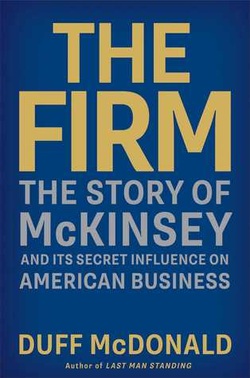
I'll be the first to admit that the audience for this book is pretty narrow. In addition to McKinsey alums looking for a shout out, the folks like me who are intrigued by the art of management and those folks interested in the (I'd argue contradictory) impulse to contract management's accountability out to MBA gunslingers, are pretty rare birds.
If you are in one of those categories, you will greatly enjoy Duff McDonald's "no-agenda" relaying of the history of McKinsey and consulting.
First, the short-falls: General Motors in the 90's; AT&T wireless and Enron were all multi-million dollar clients; and McKinsey totally missed the internet and tech revolution. Too often, to keep a client -- McKinsey "plays the role the (client) company has scripted" -- and this stands in the way of it's ability to eventually deliver quality in many engagements. Maintaining the multiple millions of dollars GM spent in the 1990's on its way to bankruptcy, for example, can blind McKinsey to seeing what the "numbers" are really suggesting.
However, in a world full of talkers and blowhards, McKinsey is supremely capable of bringing the focus back to the data and research, and usually to efficient effect. Modeling this rigor is a great gift to leaders - no matter what sector they find themselves in.
Management guru, Gary Hamel referred to the machinery of management as one of humanity's greatest inventions in his 2007 book, "The Future of Management." If McKinsey hasn't in fact invented many of the bold ideas of management, since it's founding in the 1920's by James O. McKinsey, it has certainly helped clients understand them and carry them out. And for that, alone, they have made a mighty contribution.
If you are in one of those categories, you will greatly enjoy Duff McDonald's "no-agenda" relaying of the history of McKinsey and consulting.
First, the short-falls: General Motors in the 90's; AT&T wireless and Enron were all multi-million dollar clients; and McKinsey totally missed the internet and tech revolution. Too often, to keep a client -- McKinsey "plays the role the (client) company has scripted" -- and this stands in the way of it's ability to eventually deliver quality in many engagements. Maintaining the multiple millions of dollars GM spent in the 1990's on its way to bankruptcy, for example, can blind McKinsey to seeing what the "numbers" are really suggesting.
However, in a world full of talkers and blowhards, McKinsey is supremely capable of bringing the focus back to the data and research, and usually to efficient effect. Modeling this rigor is a great gift to leaders - no matter what sector they find themselves in.
Management guru, Gary Hamel referred to the machinery of management as one of humanity's greatest inventions in his 2007 book, "The Future of Management." If McKinsey hasn't in fact invented many of the bold ideas of management, since it's founding in the 1920's by James O. McKinsey, it has certainly helped clients understand them and carry them out. And for that, alone, they have made a mighty contribution.
To be tweeted links to my new posts -- blog, book reviews (both nonfiction and fiction), data or other recommended tools -- just go to my Home page and click on the Twitter button on the right, just above the tweet stream, and follow me @jcrubicon.
 RSS Feed
RSS Feed
